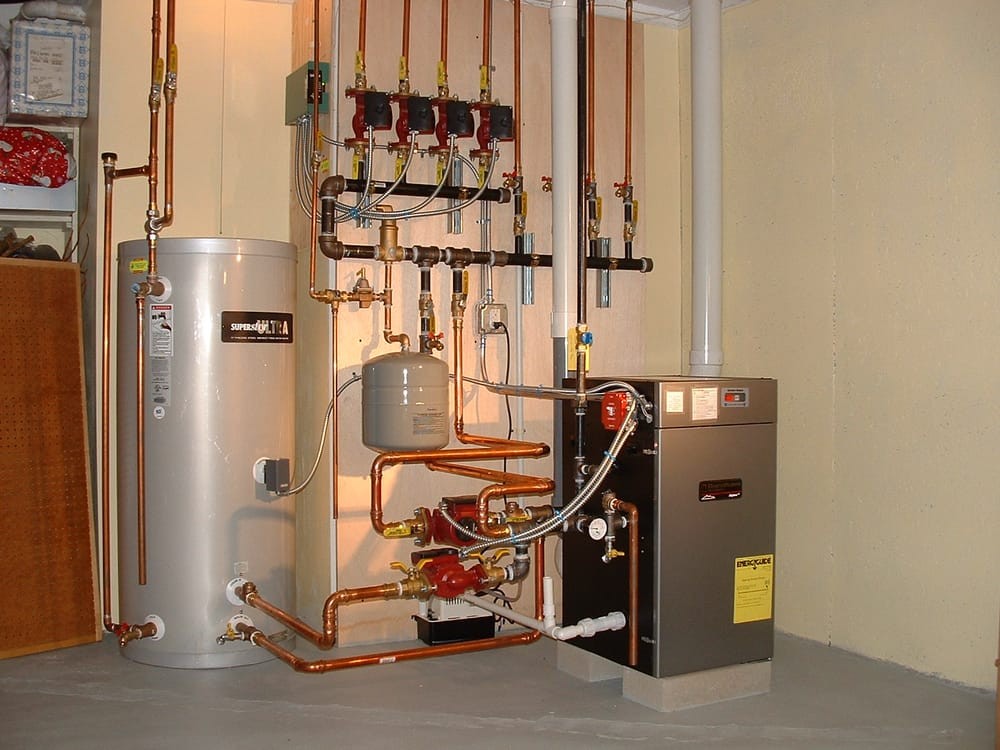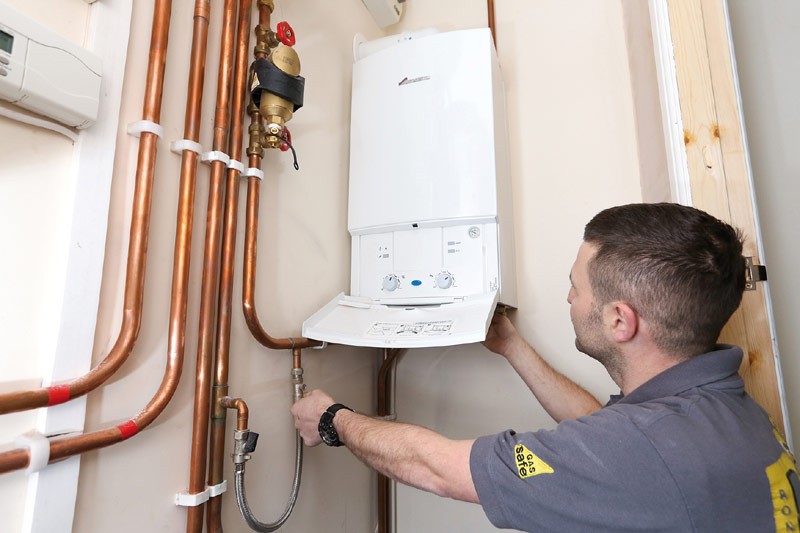How can I determine if my water heater needs to be replaced, or if it can be repaired?
How can I determine if my water heater needs to be replaced, or if it can be repaired? How often should I replace my water heater, and what are the signs that it is failing?
Subject: Water heaterDate: 3/16/2023 Status: SOLVED
8 answered / 121 voted,
 1074 viewed.
1074 viewed.
 Badboy - Thursday, March 16, 2023 1329
Badboy - Thursday, March 16, 2023 1329How can I determine if my water heater needs to be replaced, or if it can be repaired?

There are a few things to consider when trying to determine if your water heater needs to be replaced or if it can be repaired:
- Age of the water heater: The age of your water heater is one of the most important factors in determining whether it needs to be replaced. Most water heaters have a lifespan of around 10-15 years. If your water heater is approaching or exceeding this age, it may be time to consider a replacement.
- Leaks: Check for leaks around the water heater. If you notice water pooling around the base of the heater, it may indicate a leak in the tank. Leaks can often be repaired, but if the tank itself is leaking, it may be time for a replacement.
- Strange noises: If you hear strange noises coming from your water heater, such as popping or cracking sounds, it may indicate a buildup of sediment in the tank. This can often be repaired by flushing the tank, but if the noises persist, it could be a sign that the heater needs to be replaced.
- Lack of hot water: If your water heater is not producing enough hot water, it may indicate a problem with the heating element or thermostat. In some cases, these components can be replaced, but if the issue is recurring, it may be time for a new water heater.
- Energy efficiency: Older water heaters may not be as energy-efficient as newer models. If you're looking to save money on your energy bills, upgrading to a newer, more efficient water heater may be a good idea.
Ultimately, the decision to repair or replace your water heater will depend on a variety of factors. If you're unsure, it's always a good idea to consult with a professional plumber or HVAC technician. They can assess the condition of your water heater and recommend the best course of action.
How often should I replace my water heater, and what are the signs that it is failing?

The lifespan of a water heater can vary depending on the type, brand, and usage, but on average, a water heater should last about 10-15 years. However, it's important to keep an eye out for signs that your water heater may be failing. Here are some common signs that it may be time to replace your water heater:
- Age: As mentioned earlier, the average lifespan of a water heater is 10-15 years. If your water heater is nearing or exceeding this age, it's a good idea to start considering a replacement, even if it seems to be functioning normally.
- Leaks: If you notice water pooling around the base of your water heater, it may indicate a leak in the tank. Small leaks can often be repaired, but if the tank is leaking, it's time to replace the unit.
- Rusty water: If you notice rusty or discolored water coming out of your hot water taps, it may indicate that the inside of the tank is rusting and deteriorating. This can cause leaks and other problems, so it's best to replace the water heater before it fails completely.
- Strange noises: Popping, cracking, or rumbling sounds coming from your water heater may indicate that sediment has built up inside the tank, causing it to overheat and make noises. Flushing the tank can often solve this problem, but if the noises persist, it may be time for a new water heater.
- Lack of hot water: If your water heater is no longer producing enough hot water, it may indicate that the heating element is failing or that there is a buildup of sediment in the tank. This can often be repaired, but if the problem is recurring, it's a sign that it may be time for a new water heater.
It's important to keep an eye out for these signs and have your water heater inspected regularly by a professional to ensure that it's working properly and to catch any potential problems early on. If you're unsure about the condition of your water heater, it's always a good idea to consult with a professional plumber or HVAC technician.
 The best Reply
The best ReplyANSWERS Write an Answer
❝How can I determine if my water heater needs to be replaced, or if it can be repaired?❞ answers. sebastian_2008 asked first. Total 8 replies.
 0
0 0
0 0
0 0
0 0
0 0
0🛪 Santa Clarita, CA?
 0
0 0
0 0
0 0
0 0
0 0
0 0
0 0
0- Water heater lifespan
- Rusty water tank
- Leaking water heater
- Strange noises
- Inconsistent hot water
- No hot water
- Pilot light issues
- Temperature fluctuations
- High energy bills
- Sediment buildup
- Pressure relief valve problems
- Corroded or damaged pipes
- Thermal expansion issues
- Foul odors in water
- Gas or electric heating element problems
- Water temperature fluctuations
- Water heater maintenance
- Age of water heating system
- Anode rod condition
- Water heater efficiency
- Water heater leaks
- Water quality problems
- Water heater thermostat issues
- Rusty or corroded parts
- Pilot light won't stay lit
- Warranty status
- Hard water problems
- Electrical problems in water heater
- Gas supply issues
- Energy-efficient replacements
Similar Questions
What is the best method for repairing a leaking washing machine hose without calling a professional plumber?
Learn how to fix a leaking washing machine hose yourself with these DIY methods. Save time and money by following these easy steps at home.
Washing machine hose repair Answers: 0 306
306
What are the signs that indicate it's time to replace an aging water heating system?
Signs like reduced hot water supply, strange noises, leaks, and higher utility bills indicate it's time to replace an aging water heating system.
Age of water heating system Answers: 0 373
373
What are some important steps to take in preparing your home and garden for winter freezes to prevent damage and ensure survival of plants?
Protect your home and garden from winter freezes by taking important steps like insulating pipes, covering delicate plants, and using mulch to prevent damage and ensure plant survival.
Preparing for winter freezes Answers: 0 436
436
How can pressure relief valve problems in a system be identified and rectified before they lead to potential safety hazards or equipment failures?
Learn how to detect and fix pressure relief valve issues in a system to prevent safety risks and equipment failures. Stay proactive and ensure system efficiency.
Pressure relief valve problems Answers: 0 255
255
What steps should you take to winterize your plumbing to prevent frozen pipes and potential damage during frigid temperatures?
Learn how to protect your plumbing from freezing temperatures this winter. Follow these steps to prevent frozen pipes and costly damage to your home.
Winterizing your plumbing Answers: 0 344
344
What are the best methods for repairing a leaking washing machine hose to prevent potential flooding and water damage?
Learn how to effectively repair a leaking washing machine hose to avoid flooding and water damage. Follow these tips to fix the issue and protect your home.
Washing machine hose repair Answers: 0 309
309
What are the best methods for repairing a leaking washing machine hose to prevent potential flooding and water damage?
Learn how to effectively repair a leaking washing machine hose to avoid flooding and water damage. Follow these tips to fix the issue and protect your home.
Washing machine hose repair Answers: 0 366
366
What are common signs of malfunction in a gas or electric heating element, and what steps can be taken to troubleshoot and repair the issue?
Discover common signs of malfunction in gas or electric heating elements, and learn how to troubleshoot and repair the issue effectively.
Gas or electric heating element problems Answers: 0 402
402
What are some effective ways to prevent and handle frozen plumbing during the winter months?
Learn how to prevent frozen plumbing during winter by insulating pipes, keeping faucets dripping, and using heat tape. Act quickly if pipes freeze to avoid costly damage.
Dealing with frozen plumbing Answers: 0 359
359
What are some effective methods for protecting pipes from freezing during cold weather to prevent costly damage and repairs?
Protect your pipes from freezing in cold weather with insulation, heat tape, and letting faucets drip. Prevent costly repairs by taking proactive measures.
Cold weather pipe protection Answers: 0 259
259
Similar Articles
Plumber, Plumbing System, Master Plumber
Plumbing SystemPlumbing is any system that conveys fluids for a wide range of applications. Plumbing uses pipes, valves, plumbing fixtures, tanks, and
 79
79Dealing with a Leaking Toilet Tank: A Comprehensive Guide
Dealing with a Leaking Toilet Tank: A Comprehensive Guide A leaking toilet tank can be a persistent and bothersome issue that not only wastes water b
 114
114
